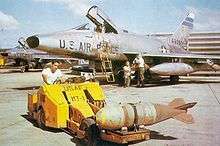M117 bomb
The M117 is an air-dropped demolition bomb[1] used by United States military forces. The weapon dates back to the Korean War of the early 1950s. Although it has a nominal weight of 750 pounds (340 kg) its actual weight, depending on fuze and retardation options, can be around 820 pounds (372 kg). The bomb's explosive content is typically 386 pounds (175 kg) of Tritonal[1] or 377 pounds (171 kg) of Minol in the case of the M117A1E2[2]due to their higher density and detonation velocity compared to TNT. Demolition bombs rely on time delayed fuzes which allow the bomb to burrow into a building or other structure before detonating. The M117 can be configured with a conical low-drag tail for medium and high altitude deliveries or a high-drag tail fin for low-altitude drops, delaying the bombs hitting their targets ensuring fighters are out of the blast zone before detonation.[3]
| M117 | |
|---|---|
 | |
| Type | Free-fall demolition bomb[1] |
| Place of origin | United States |
| Service history | |
| In service | 1950s–2015 |
| Used by | United States |
| Wars | Korean War, Vietnam War, Operation Desert Storm |
| Production history | |
| Variants | M117A1, M117A1E2, M117D, M117R |
| Specifications | |
| Mass | 340 kg |
| Length | 2.06 m-2.16 m |
| Diameter | 408 mm |
| Maximum firing range | Air Dropped |
| Warhead | Tritonal or Minol |
| Warhead weight | 171 - 183 Kg |
| Wingspan | 520 mm |
Guidance system | none, free-fall |

History
From the 1950s through the early 1970s the M117 was a standard aircraft weapon, carried by the F-100 Super Sabre, F-104 Starfighter, F-105 Thunderchief, B-57 Canberra, F-111, F-5, A-1 Skyraider, A-4 Skyhawk and F-4 Phantom. The M117 series was used extensively during the Vietnam War, and B-52G Stratofortress aircraft dropped 44,600 M117 and M117R bombs during Operation Desert Storm.[3][4]
The B-52 Stratofortress was the last aircraft to use the bomb; tactical aircraft had mostly switched to using the Mark 80-series bombs, particularly the Mark 82 (500 pounds (227 kg)) or Mark 84 (2,000 pounds (907 kg)) bombs and their guided equivalents. On 26 June 2015, the last Mk 117 in PACAF inventory was dropped by a B-52H crew on an island near Andersen AFB, Guam.[5]
Variants
- M117A1
- The M117A1 is essentially the same bomb as the M117 with the exception of the following components which have been removed: center lug, two spring washers utilized to hold the electrical fuzes in the nose and base and a ring receptacle lock utilized in the electrical fuze cable assembly.[2]
- M117A1E1
- M117A1E2
- The M117A1E2 is identical to the M117A1 with the exception that the explosive filler Minol II(377 pounds (171 kg)) is used instead of Tritonal.[2] Minol II was used in an effort to offset the shortages of TNT in the late 1960s, however, problems developed during the storage of M117 bombs filled with Minol II, especially in hot, tropical areas which caused the explosive filler to expand and ooze or extrude through the joints of the bomb. While determined safe to handle, the extruded material required maintainers to clean the bombs before transportation or usage. The U.S. Navy refused to use M117 bombs with the Minol II filler citing, "Because of the proximity of crew quarters to the ships’ magazines where explosives are stored and the necessity of handling ordnance on rolling and pitching vessels, the Navy has regarded Minol II as being a potential hazard to the safety of its ships ’ crews and thus has not approved its use aboard ship." [6]
- M117A1E3
- M117A2
- M117A3
- M117D
- The M117D (D - Destructor) looks similar to the M117R but uses a magnetic influence fuze, which enables the bomb to function as a mine. The M117D is released in a high-drag configuration for a ground implant or shallow water mining. It detonates when an object passing near the bomb triggers the fuze.[3]
- M117R
- The M117R (R - Retarded) uses a special fin assembly providing either high-drag or low-drag release options. For low altitude deliveries, the tail assembly opens four large drag plates which rapidly slow the bomb and allow the aircraft to escape its blast.[3]
- MC-1
- The M117 was the basis of the MC-1 chemical warfare bomb, which had the body cavity filled with sarin nerve gas. The MC-1 was never used by the U.S. in combat and was eliminated from the U.S. stockpile in June, 2006.[7]
Tail Assemblies
- BSU-85/B
- Air-inflatable retarder
- BSU-93/B
- Air-inflatable retarder
- M131/M131A1
- Early low-drag conical tail assembly utilized for high-altitude bomb drops.
- MAU-91A/B
- High-drag tail assembly utilized to drastically reduce the free-fall speed of the M117 and when utilized in low-level bombing, allowed fighter aircraft sufficient time to clear the blast area before bomb detonation. M117 bombs utilizing this style tail assembly were designated M117R.
- MAU-103A/B
- Low-drag conical tail assembly which began service with the M117 in the 1970s.[8]
References
- "OP 1280 Aircraft Bombs" (PDF). 30 August 1955. Retrieved 2019-04-07.
- "Technical Order 11-1-25 Bombs and Bomb Components" (PDF). April 1966. Archived from the original (PDF) on 2018-07-05. Retrieved 2019-04-07.
- USAF Museum: M117 Bomb Archived 2010-12-25 at the Wayback Machine
- Janes Air Launched Weapons Issue 36. ISBN 0-7106-0866-7.
- http://www.af.mil/News/ArticleDisplay/tabid/223/Article/607252/blast-from-the-past-last-m117-bomb-dropped-near-guam-coast.aspx
- B-175182 Suggestion To Use Minol II as Explosive Fill in Air Force M117 (750 Pound) and MK82 (599 Pound) Bombs
- "Depot and Disposal Facility reach significant milestones" (PDF). June 12, 2006. Archived from the original (PDF) on November 20, 2008. Retrieved 2007-09-22.
- Janes.com: MAU-10 Low Drag Bomb
- Arsenal of Democracy II, Tom Gervasi, ISBN 0-394-17662-6
- Janes Air Launched Weapons Issue 36, ISBN 0-7106-0866-7